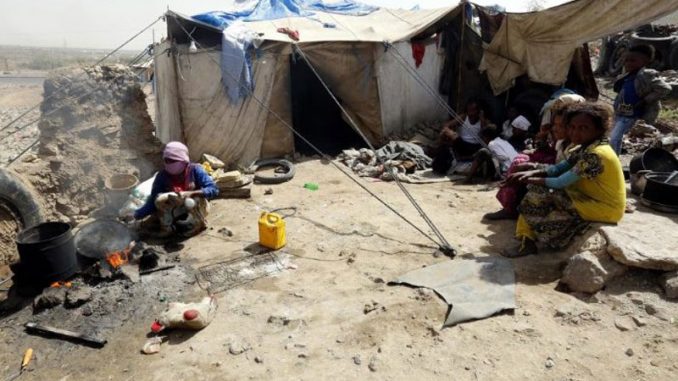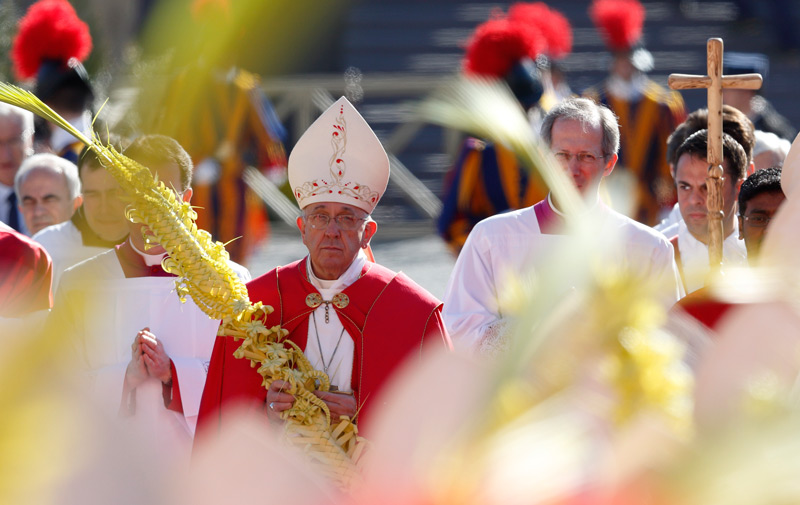
VATICAN CITY—Each year during World Day of Migrants and Refugees, church leaders draw attention to the plight of people forced to flee their homes — and their countries — often with just the clothes on their back, in search of safety and security.
In his message on the last Sunday of September, Pope Francis drew attention to the bronze sculpture in St. Peter’s Square entitled “Angels Unawares” and reiterated that the world’s Internally Displaced People “are forced to flee just like Jesus and his family. ”
The cause of migrants and refugees has been a salient feature of the pontificate of the 83-year old pontiff as he continues to call for attention and new policies for the world’s growing number of internally displaced people.
Pope Francis has been joined by the Caritas confederation of Catholic Charities worldwide in echoing the cry of the world’s internally displaced people for justice, dignified life and safe return home.
Caritas Internationalis urged governments to provide unconditional access to basic services and a dignified and safe return home for all internally displaced people around the world.
“We want to echo their cry for justice by calling for immediate and timely action,” said Aloysius John, Caritas Internationalis Secretary General. He said that throughout the world, Caritas has been in constant and direct contact with those living the dramatic situation of being displaced in their own countries — people left all on their own, deprived of conventional legal protection.
According to the Global Report by the Internal Displacement Monitoring Centre, 45.7 million people were internally displaced as a result of conflict and disasters in 61 countries and territories around the world by the end of 2019.
“This figure is the highest ever recorded,” John said. “But despite the growing numbers and the urgency, until now, the dramatic situation of the IDPs was not adequately addressed on an international level.”
He explained that unlike refugees, who are granted international protection, Internally Displaced People don’t benefit from a high level of legal international protection, because they remain within the borders of their own countries.
“They are victims of undemocratic political systems and environmental disorder which leads to hunger, war and violence,” John said. “They are among the most vulnerable people on the planet yet they are denied their basic right to live a dignified life.”
IDP children, especially young girls and women, he said, are even more vulnerable and are often objects of exploitation, abuse and sexual violence.
Caritas Internationalis noted that many situations of internal displacement have become protracted because the root causes of forced displacement have not been addressed or remain unresolved, such as in the conflict situations of Syria, Colombia and Ukraine.
People have also been internally displaced as a result of natural disasters and famines such as in Somalia, Burkina Faso, Mali and the Philippines, or due to climate change, where continuing conditions of insecurity prevent forcibly internally displaced people from returning home.
“We cannot continue to close our eyes to this tragedy,” John said, urging “governments and the international community to take immediate action for internally displaced people.”
Caritas stressed that internally displaced people must have unconditional access to basic needs — such as food and water — and services, thus enabling them to live a dignified life, especially at this time of COVID-19 pandemic.
The agency urged governments to ensure a safe and dignified return home for those who want and can return. It also appealed for a “global ceasefire, in order to suspend the conflicts that are among the main causes that force internally displaced people to flee”.
Bishop Mario E. Dorsonville, auxiliary bishop of Washington, and chairman of the United States Conference of Catholic Bishops’ Committee on Migration, also urged people to reflect on the plight of immigrants and refugees.
“We are reminded that regardless of our background, we are all built in the image of God and should be treated as such,” Bishop Dorsonville said in a statement.
He noted that Pope Francis highlighted how the COVID-19 pandemic has exacerbated the forced displacement of people and the difficulties they encounter when seeking protection. He urged the world to unite in addressing forced displacement and “pray for the well-being of our immigrant and refugee brothers and sisters as we continue to work to bring solidarity, compassion and love throughout our human encounters.”
“It is of vital importance for us to embrace love for our neighbor as we love ourselves and live out this commitment daily,” Bishop Dorsonville stated. “Our Holy Father, Pope Francis, also noted in his annual message, ‘To preserve our common home and make it conform more and more to God’s original plan, we must commit ourselves to ensuring international cooperation, global solidarity and local commitment, leaving no one excluded.’”
Learn more here about internal displacement, or visit USCCB’s Justice for Immigrants website.
Robin Gomes/Vatican News and USCCB


